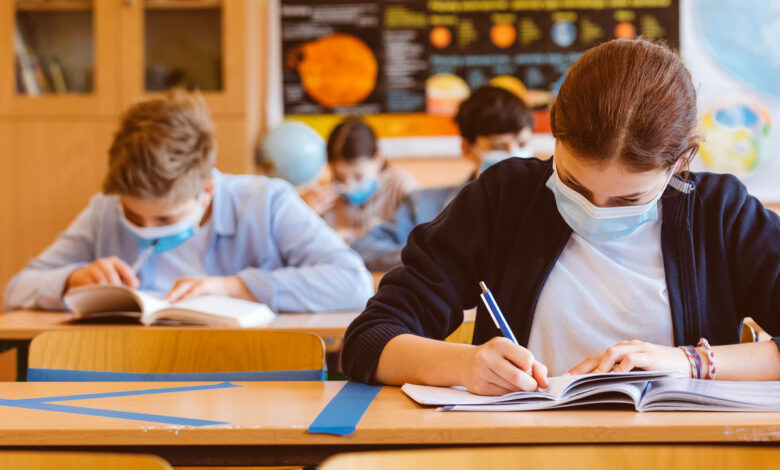K-12 schools should implement universal masking to protect younger kids, expert says

Amid rising COVID-19 cases largely due to the delta variant, K-12 schools should instate universal masking measures to safeguard younger kids who are not yet eligible for vaccination, an Infectious Disease Society of America (IDSA) expert said Tuesday.
The advice, given by Dr. Tina Tan, member of the IDSA board of directors and professor of pediatrics at Northwestern University, Feinberg School of Medicine, goes a step further than guidance given by the Centers for Disease Control and Prevention (CDC), which currently recommends masks for unvaccinated individuals.
The health agency does note that “based on the needs of the community, school administrators may opt to make mask use universally required (i.e., regardless of vaccination status) in the school.” It is expected to issue an update Tuesday that some vaccinated people should return to wearing masks indoors.
WHERE TO FIND A COVID-19 VACCINE CLOSEST TO YOU
However, several states have already moved to ban mask mandates in schools, prompting families with immunocompromised members to worry about safely returning to in-person learning this fall.
“I think that in the K-12 space, I do think mask mandates or universal masking in school settings should be enforced,” Tan said during a briefing Tuesday, adding that immunocompromised students attending schools without mandates should still choose to wear one.
Tan cited data indicating that only 30% of kids aged 12-17 have received a COVID-19 vaccine, leaving a high number of students vulnerable to potential infection, especially as the delta variant surges in areas with low vaccination rates. She noted that rates of COVID-19 infection among kids, which currently account for about 14.2% of all cases in the U.S., have risen over the last month due to the variant.
CALIFORNIA TO MANDATE COVID-19 VACCINE OR WEEKLY TESTING FOR ALL STATE WORKERS
“In order to protect these children who are too young to be vaccinated, efforts should be made to vaccinate all eligible people around these children,” Tan stated, later noting that many teachers and staff in schools have not yet received a vaccine, prompting the need for more protective measures to safely return to in-person learning.
Among those protective measures, she said, is universal masking regardless of vaccination status, as well as social distancing, good ventilation and cohorting.
“In the K-12 space, because the number of individuals vaccinated is a minority, I really do think that in order to protect students who are going to be attending in-person school you really need to have mask mandates in place,” she said.
When asked about the role of routine testing for K-12 institutions, she said that while funds were set aside to expand capabilities, it remains “very, very difficult” for several reasons, including that the money was used to improve other aspects of schools.
CLICK HERE FOR COMPLETE CORONAVIRUS COVERAGE
And as far as a return to extracurricular activities, Tan said it may be necessary to “go back to what we were doing prior to the availability of vaccination,” which includes weighing risk of infection during the activity.
Dr. Preeti Malani, an IDSA fellow and the chief health officer at University of Michigan, was also in the briefing and said that rather than focus on what can and can’t be done, schools should focus on how to safely resume extracurricular activities so that it’s “not zero risk, but acceptable risk.”
Source link





